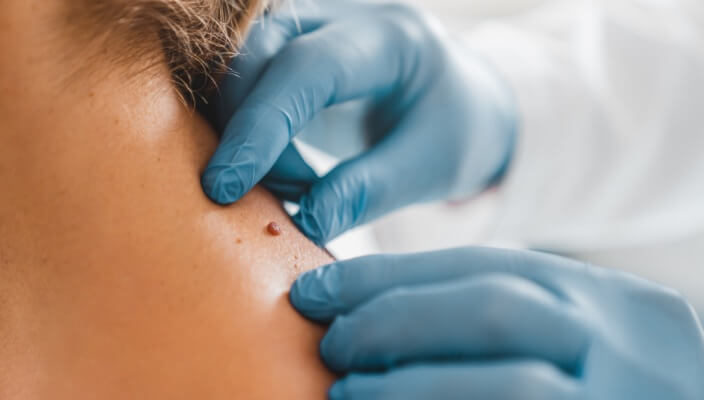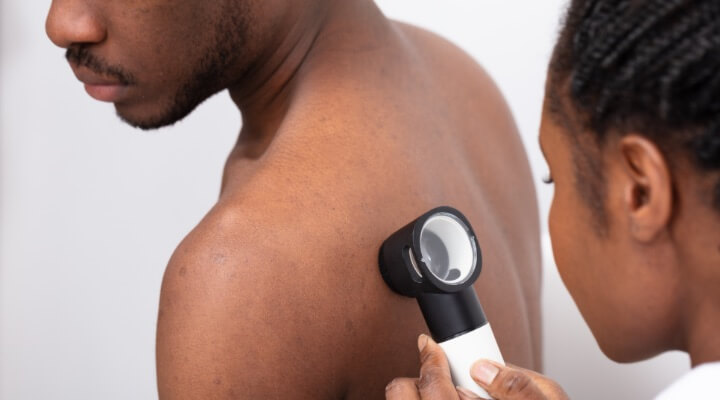Skin Cancer in People of Color: Myths & Facts
It's Time to Face the Facts
 It’s time to face the facts: skin cancer can develop in individuals of all skin colors, including those with darker skin tones. Even though skin cancer is less prevalent in nonwhite racial ethnic groups, such as brown and black communities, research shows that skin cancer rates are rising among people of color.
It’s time to face the facts: skin cancer can develop in individuals of all skin colors, including those with darker skin tones. Even though skin cancer is less prevalent in nonwhite racial ethnic groups, such as brown and black communities, research shows that skin cancer rates are rising among people of color. We’re here to help clear up any confusion and provide you with expert information regarding skin cancer in people of color by covering some common myths and highlighting a few important facts.
Myth: Darker Skin Is Immune to Skin Cancer
Because individuals with darker skin tones tend to not get as burnt from the sun as those with lighter skin tones, many people believe they are immune to the damaging effects of UV radiation, including skin cancer. However, this couldn’t be further from the truth.
Fact: All Skin Colors Are at Risk of Developing Skin Cancer
According to the Columbia University Department of Dermatology, “studies show that Black and Hispanic Americans who live in sunnier parts of the country have greater rates of melanoma and that UV radiation also correlates with other types of skin cancer in people with darker skin tones.”
Even more concerning is that when skin cancers are diagnosed in people of color, they tend to be diagnosed at a later stage, which means a worse prognosis. One study, for example, found an average five-year melanoma survival rate of only 67 percent in Black people versus 92 percent in white people.
Myth: Skin Cancer Only Shows Up on Skin-Exposed Areas
There’s a common myth that skin cancer only shows up on skin-exposed areas, such as the scalp, ears, hands, back, neck, and shoulders. While this is more common among people with lighter skin tones, it’s not necessarily true for people of color.
Fact: Skin Cancer Cases in People of Color Often Occur in Less Exposed Areas
According to data collected by The Skin Cancer Foundation, skin cancers in people of color can be more difficult to detect since they occur in less-exposed, out-of-the-way areas.
For instance, melanoma in people of color most commonly shows up on the lower extremities (more specifically: the soles of the feet).
Myth: It's Harder to Diagnose Skin Cancer in People of Color
Since many skin cancers show up on the skin as irregular moles, discolored brown spots, small sores, or pearly nodules, many believe that it’s harder to spot these abnormalities and, as a result, harder to diagnose skin cancer in people of color.
Fact: Board-Certified Dermatologists Are Highly Experiences in Diagnosing Skin Cancer Among All Ethnicities
While it may be hard for everyday individuals to evaluate their skin and identify an abnormality, this shouldn’t be an issue for a trained and experienced dermatologist.
At Cumberland Skin, our team of board-certified physicians know what to look for when it comes to skin cancer. Whether it’s pointing out a suspicious spot on someone with lighter skin, or uncovering an abnormal mole on a patient of color, we know how to identify and treat all forms of skin cancer.
This is why it’s important to schedule an annual skin cancer screening, even if you believe you’re not at risk.

Schedule Your Skin Cancer Screening at Cumberland Skin
If you’re overdue for a skin cancer screening or have never had one before, we urge you to reach out to our clinic and schedule a screening today. Our dermatology clinics are conveniently located in Lebanon, Hermitage, Hendersonville, and Spring Hill, Tennessee.
Featured Products
Check your local office for current stock!
Check your local office for current stock!
Related Blog Posts

- Skin Cancer
- Skin Exams
- Sun Safety
Debunk myths about basal cell carcinoma (BCC). Learn the truth about BCC's risks, prevention, and recurrence to effectively protect your skin and health.
Read More
- Skin Cancer
- Sun Safety
Summer safety is more than just putting on sunscreen; many other factors to consider when keeping yourself and your children safe from damage and potential skin cancer.

- Skin Cancer
- Skin Exams
With skin cancer cases rising year after year, it’s no surprise that people are itching to learn more about this life-threatening skin disease
Read More


